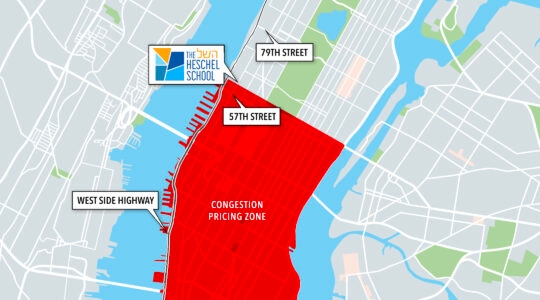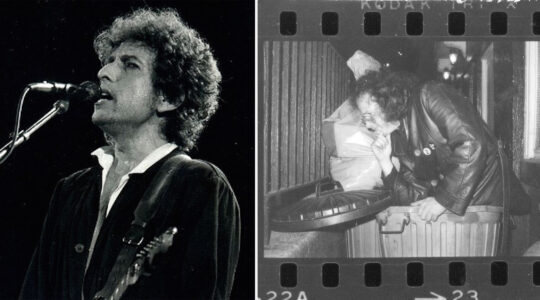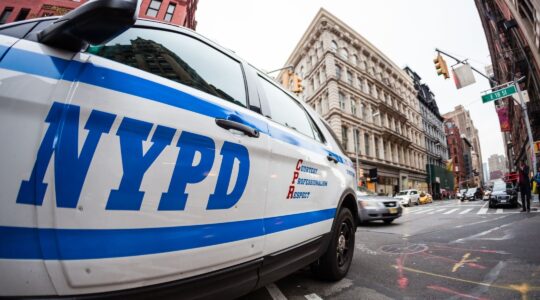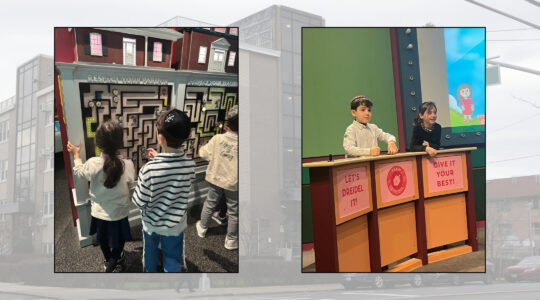SAN FRANCISCO (JTA) — The University of California Board of Regents addressed the recent spate of hate violence and racist vandalism at its campuses by announcing a series of measures designed to monitor and prevent hate violence in the university system.
Among the incidents that provoked a three-hour meeting Wednesday devoted to the violence was the heckling of Israeli Ambassador Michael Oren during a speech at UC Irvine several weeks ago. At UC Davis, a swastika was carved into a freshman student’s dorm door; five more were scrawled on walls and bulletin boards. At UC San Diego, a noose was found hanging in the university library and a Ku Klux Klan-style hood was draped on a statue.
Acknowledging that bigotry and prejudice “won’t go away immediately,” University of California President Mark Yudof apologized to students at Wednesday’s meeting, which was streamed live.
“What we have witnessed in the past few weeks are the worst acts of racism and intolerance I’ve seen in 20 years,” Yudof told the hundreds who attended the open meeting at the San Francisco campus.
“As a university, we have to recognize we have a problem,” he said. “We must address a campus climate that leaves students feeling marginalized — class by class, department by department.”
Chancellors from UC Davis, Irvine and San Diego — the three campuses hardest hit by the hate violence — appeared before the regents to outline their action plans.
Among the measures announced was the appointment of a special adviser on racial issues at San Diego. The school was thrown into an uproar recently by a racially charged off-campus party where participants were asked to dress and act according to offensive African-American stereotypes.
At Irvine, 11 students were arrested Feb. 8 for heckling Israel’s ambassador; charges are pending. The students have taken to calling themselves the Irvine 11.
At Davis, offensive words were spray-painted on the walls of the center for gays, lesbians, bisexuals and transgenders.
“Whether it’s a swastika or a noose, the intent is the same — to hurt, to wound,” said regent Eddie Island. “I want to extend a personal apology to every African-American, Latino and Jewish student.”
Despite the heartfelt apologies and announcements of new measures, a subtle line was drawn between the “ghetto” parties and swastikas soundly deplored by students, chancellors and regents, and the heckling of Oren, which some speakers said fell into the category of protected free speech.
“We stand in solidarity with the Irvine 11,” declared Jesse Sanchez, president of the University of California Student Association in his opening words to the regents during the meeting.
Regent Sherry Lansing challenged Irvine Chancellor Michael Drake on the topic, asking whether Oren had been permitted to finish his speech — he had, Drake said — and noting the history of Muslim-Jewish tensions at the university.
Pointing to UCLA, which recently inaugurated an Israeli studies program “to educate people about the Middle East in a fair and balanced way,” Lansing urged Drake to visit the Los Angeles school and learn about the program.
“It’s only an hour away,” noted Lansing, a former film studio executive.
The heckling incident drew fire nationwide, with a handful of Jewish organizations, led by the Zionist Organization of America, calling for Jewish students and funders to boycott UC Irvine.
Most Jewish groups opposed the boycott call, as did all five Jewish student organizations on campus. But several groups joined the Anti-Defamation League in calling upon Drake to step up efforts to deal with anti-Semitic intimidation on campus and to monitor anti-Semitic speakers.
Irvine is investigating charges that a British speaker brought to campus last year by the Muslim Student Union may have violated federal anti-terrorism law due to alleged involvement in raising money for Hamas.
In his address to the regents, Drake underlined his deep dismay at the heckling of Oren, saying it crossed the line from free speech into “intolerable behavior.”
The eight arrested students from Irvine — three others were from UC Riverside — are under investigation, he said, and if found in contempt of university behavior codes will be punished.
University administrations must draw clear distinctions between the free exchange of political opinions and behavior aimed at silencing others, Drake said.
“Issues related to the Middle East conflict play themselves out on our campuses,” Drake said. “No matter which side you’re on, people benefit from learning tolerance and listening respectfully.”
Students addressed the Board of Regents during a 40-minute public session before the meeting, urging greater protection for gay, Jewish, Latino and African-American students in particular.
“We’re trying to mitigate race riots here,” warned Jesse Cheng, this year’s student representative on the Board of Regents.
All three chancellors described extensive plans already in motion to mitigate the problem at their schools.
Davis Chancellor Linda Katehi said her administration is cooperating fully with the FBI investigation into the hate incidents, creating a campus diversity committee including Hillel and black student organizations, and launching a year of speakers and events to “affirm our principles of community,” she said, referring to the school’s code of values.
Davis also is exploring ways to incorporate the values of tolerance and diversity into the required curriculum.
San Diego Chancellor Marye Fox vowed active prosecution of the perpetrators at her school, along with curriculum changes and a new “campus climate commission” tasked with enhancing the school’s system of bias reporting and expanding opportunities for students to take part in cross-cultural initiatives.
The New York Jewish Week brings you the stories behind the headlines, keeping you connected to Jewish life in New York. Help sustain the reporting you trust by donating today.




